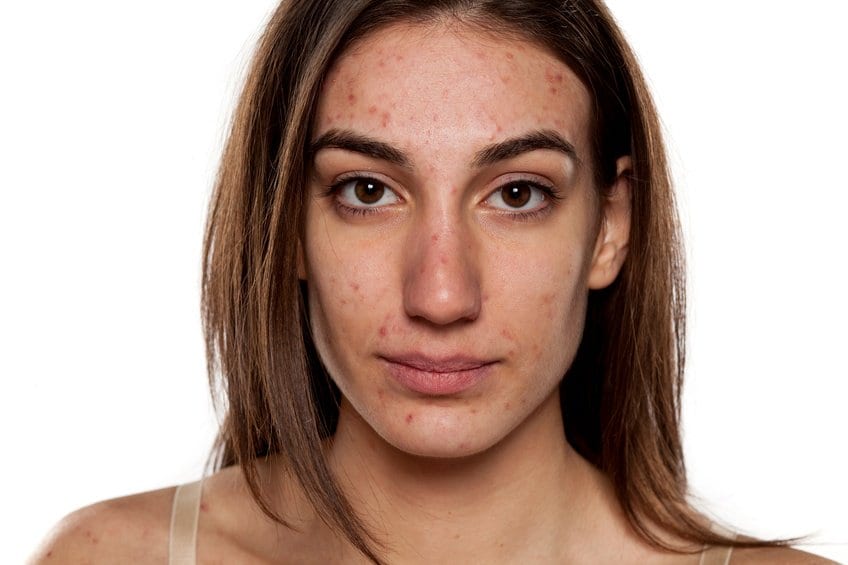Clean 21: 21 Day Detox
Our Signature 21-Day Full-Body Reset
Questions? Ask about this product
Free Shipping On Orders Over $50
Complementary products


There are many types of acne and just as many names — pimples, zits, blemishes, spots, and breakouts can show up in many different ways and for many different reasons from person to person. To get a better idea of how to treat problem skin, we’re taking a deeper look at the different types of acne and their causes.
For some people, simple dietary changes with the help of the 21-Day Clean Program can be enough to clear up acne, while others may need a more targetted approach to see improvement skin improvements.
Acne is a blanket term for a common skin disease characterized by pimples or blemishes, that can occur over many parts of the body — commonly the face, back, and chest. Despite popular belief that acne only affects us during puberty, it can actually happen at any age. Acne occurs when pores become clogged with oil, dead skin cells, and bacteria.
Blackheads and whiteheads, also known as comedones, are a result of clogged pores from oil and dead skin cells. A blackhead is an open comedo, meaning that the oil-clogged pore is exposed to air. Their telltale black color is actually from oxidized oil, not dirt.
A whitehead is a closed comedo. Without the exposure to air (and oxidation), the clogged pore appears white. Comedones are best prevented by regulating oil production with gentle regular exfoliation.
Papules and pustules, more commonly known as “pimples” are caused when the clogged pore gets so irritated that the cell wall breaks and bacterial growth and inflammation occur. Papules are regular pimples with small pink or red raised bumps and a soft, white surface.
Pustules are larger pimples or papules that have become inflamed and infected. Pustules are large, swollen, and are typically filled with white or yellow pus.
Cysts and nodes also know as cystic acne can be the most painful and the hardest to treat. Cysts and nodules are painful, swollen lumps under the skin caused by clogged pores and bacteria in the deeper levels of the skin. These are often linked with underlying issues like hormonal imbalance and gut health.
Acne rosacea can be a confusing condition. Rosacea is a skin condition characterized by flushing and redness of the face and broken capillaries. While not a true acne, some forms of rosacea can look similar to types of acne with small raised, red bumps. This is called papulopustular rosacea, or acne rosacea. The bumps associated with acne rosacea may be itchy, take a long time to heal and will generally not respond to typical acne treatments like salicylic acid. Acne rosacea is often linked with underlying issues like autoimmune disease and gut health.
What Causes Certain Types of Acne?
Just like there are different types of acne, there are different causes of acne. Some people may be affected by only one of these factors, and some may need to address several before seeing improvements in their skin.
Gut health and gut-skin connection are important factors in acne-prone skin. Inflammation from certain foods, pollution, or gut deficiencies can all show through on our skin. If digestion and elimination are sluggish and toxins and waste aren’t moving through daily bowel movements, then the body may try to expel those through the skin.
Our top foods for healthy skin are a wonderful way to achieve balance through digestion and beautiful skin. We also recommend supplementing with a high-quality probiotic daily and blended, easy-to-digest and nutrient-dense smoothies like our Daily Shake.
Hormonal imbalance can increase the rate of production of skin cells and increase the amount of oil produced by the sebaceous glands, increasing the likelihood of clogged pores. Hormonal acne is most common during periods of hormonal shifts like puberty, pregnancy, menstruation, and perimenopause. Some types of acne such as cysts and nodules are often caused by underlying hormonal imbalance symptoms like low functioning thyroid, high estrogen, or conditions like polycystic ovarian syndrome (PCOS).
Inflammation can be a result of an underlying health condition like gut health or hormonal imbalance, but it can also be influenced by a number of other factors like:
Recent studies have shown that inflammatory markers are higher in those with acne.
If you are suffering from one or more of these types of acne, you are not alone. Keep in mind that not all home remedies for acne work so it’s best to reach out to a Wellness Coach for a free one-on-one consultation on how to get clear skin or talk to your dermatologist about healthy solutions.